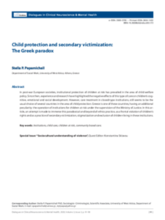Abstract
In post-war European societies, institutional protection of children at risk has prevailed in the area of child welfare policy. Since then, experience and research have highlighted the negative effects of this type of care on children’s cognitive, emotional and social development. However, care treatment in closed-type institutions, still seems to be the usual choice of several countries in the area of child protection. Greece is one of these countries, having an additional peculiarity: the operation of institutions for children at risk under the supervision of the Ministry of Justice. In this article, an attempt is made to immerse this paradoxical and beyond all ethics practice, as a frontal violation of children’s rights and as a practice of secondary victimization, stigmatization and exclusion of children living in these institutions.

